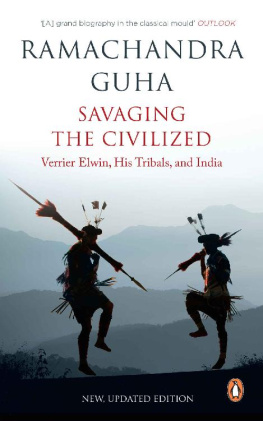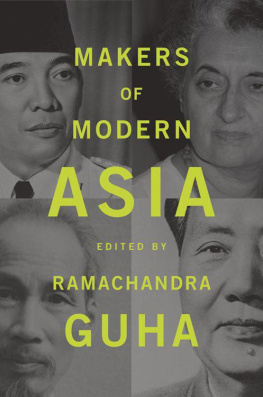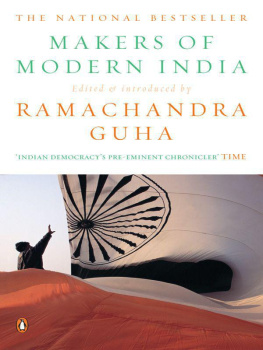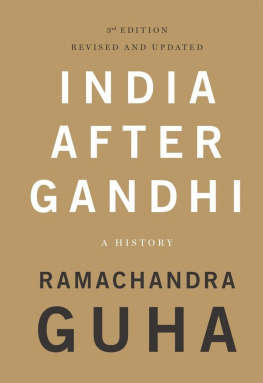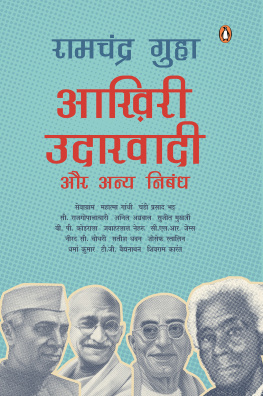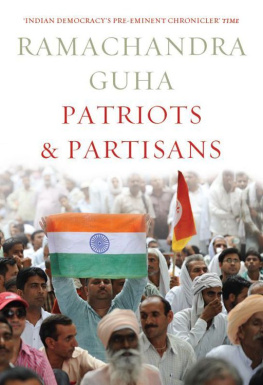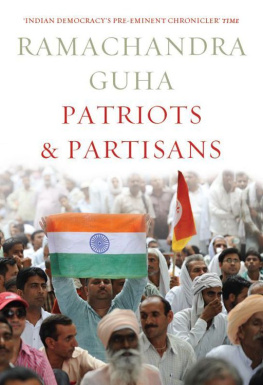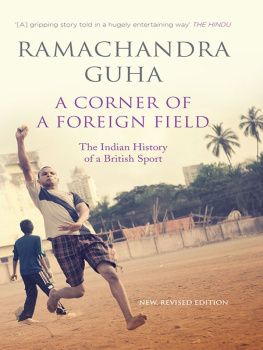THE LAST LIBERAL
&
OTHER ESSAYS
For our entire range of books please use search strings "Orient BlackSwan", "Universities Press India" and "Permanent Black" in store.
THE LAST LIBERAL
&
OTHER ESSAYS

Ramachandra Guha
Published by
PERMANENT BLACK
Himalayana, Mall Road, Ranikhet Cantt,
Ranikhet 263645
Distributed by
Orient Blackswan Private Limited
Registered Office
3-6-752 Himayatnagar, Hyderabad 500 029 (A.P.), INDIA
e-mail:
Other Offices
Bangalore, Bhopal, Bhubaneshwar, Chennai,
Ernakulam, Guwahati, Hyderabad, Jaipur, Kolkata,
Lucknow, Mumbai, New Delhi, Noida, Patna
PERMANENT BLACK 2004
eISBN 978 81 7824 423 5
e-edition:First Published 2013
ePUB Conversion: .
All rights reserved. No part of this publication may be reproduced, distributed, or transmitted in any form or by any means, including photocopying, recording, or other electronic or mechanical methods, without the prior written permission of the publisher, except in the case of brief quotations embodied in critical reviews and certain other noncommercial uses permitted by copyright law. For permission requests write to the publisher.
ALSO BY RAMACHANDRA GUHA
The Unquiet Woods: Ecological Change and Peasant Resistance
in the Himalaya
Wickets in the East
Spin and Other Turns
Savaging the Civilized: Verrier Elwin, His Tribals, and India
Environmentalism: A Global History
The Use and Abuse of Nature (with Madhav Gadgil)
An Anthropologist among the Marxists and Other Essays
The Picador Book of Cricket (edited)
A Corner of a Foreign Field: The Indian History of a British Sport
For Keshav Desiraju and Gopal Gandhi
the most civilized of civil servants
Contents

People and Places
Literature and Life
Acknowledgements

B ehind every published writer are some risk-taking editors. The essays printed in these pages were first commissioned by Kanak Mani Dixit at Himal; Krishna Raj at the Economic and Political Weekly; Subhashree Krishnaswamy at the Indian Review of Books-; Ayesha Kagal at the Times of India; Rudrangshu Mukherjee at The Telegraph; John Ryle at the Times Literary Supplement; and, above all, Nirmala Lakshman at The Hindu. Most essays do not appear here as originally published; they have been substantially revised and expanded for the book. Yet without these kindly editors they would never have been written at all.
I owe a very large debt to Rukun Advani, who, fifteen years ago, published my first book, and has now published this one. In between, he has encouraged and chastised me, and run his red pen over texts of all sizes and tones.
Acknowledgements
A little above Rukun in the hierarchy of my creditors is my wife, Sujata. My thinking and my prose owe much to her deeply developed sense of discrimination. She has made an excitable extremist into some kind of moderate: though it has taken her twenty years.
'When the facts change I change my mind. And what do you do, sir?'John Maynard Keynes, to an unnamed dogmatist
Introduction:
Nehruvian Indians

I call myself a Nehruvian Indian. How else would you describe a Tamil whose family has been domiciled for four generations in Karnataka, but who was born in Dehra Dun, educated in Delhi and Calcutta, and who, from the sound of his name, could be taken for a Bengali? The identity of most Indians is determined by their language, caste, religion, and native village. But I witnessed my first sunset two thousand miles north of where my forefathers come from. My grandfather called himself a Brahmin and wore a thread; my father didn't, while I detest caste. The languages I speak are English and Hindi (in that order). And while I do not disown my ancestral faith, what I make of Hinduism seems rather different from what its modern votaries claim it stands for.
I like to think that the term 'Nehruvian Indian' captures more than my own c.v. Take this incident from the life of a professor of history named A.R. Khan. He teaches in Shimla, but much of his family lives in Pakistan. His brother in Karachi invited him to his daughter's wedding and had persuaded him to stay on for a whole month after the ceremony. However, a week after he left India Professor Khan phoned a friend in Delhi: he was coming back in two days, could he please be picked up at the airport? The friend went to Palam airport to meet him and asked why he had come back so soon. ' Wahan sab saal Mussulman hain, said Professor Khaneveryone is a bloody Muslim there. 'Na koi Tripathi, na koi Senguptaya Chavan, na koi Ahluwalia aurna koiMenezes. Main ek hafte mein bore hogaya.' The social homogeneity of Pakistan was killing. Its people all spoke the same language, and subscribed to the same faith.
I heard this story, years ago, from the friend of the professor who picked him up at the airport. I recently found it repeated by the columnist Saeed Naqvi, who put his brother Shann where I have put A.R. Khan: as the Indian Muslim who visits Pakistan to see his relatives but returns early, disappointed by the dreary dulness of the Promised Land. This re-telling is testimony perhaps not only to the story's worth, but also to its truth. India is not, or at least not yet, a Hindu Pakistan. For that we have to thank plenty of men and women, but most of all our first and long-serving prime minister, Jawaharlal Nehru.
In his book The Good Boatman, Rajmohan Gandhi asks the question: why did Mahatma Gandhi anoint Nehru his heir? The choice is (or was) puzzling, for in many respects the two men spoke a different language. One was religious while the other was not. One was abstemious but the other was not. One looked backwards to a pre-industrial past while the other wanted to claim a modern factory future. One was a proto-anarchist who turned his back on public institutions, the other worked from the commanding heights of the state. Why, given these fundamental differences in personality and ideology, did Gandhi designate Nehru his successor?
To answer this puzzle Rajmohan Gandhi takes us back to the summer of 1947. In this, the last weeks of a united India, Mahatma Gandhi referred to himself as a Sindhi and a Punjabi, as a lover of all socialists and a father to young communists. These multiple identities, says Rajmohan, show how the Mahatma strove strenuously to 'include all India in his family.' So, all his political life, did Jawaharlal Nehru. This cannot be said with the same certainty of other members of Gandhi's inner circle. Thus, Vallabhbhai Patel and C. Rajagopala-chari must both also have been on the very short list from which the Mahatma chose his successor. However, while Patel was as deeply committed to inter-communal harmony, and Rajagopalachari was a religious pluralist who also worked to abolish 'untouchability', neither was wholly able to escape the mark of his parish. Patel was seen by many Indians as a Gujarati Hindu, Rajaji as a Tamil Iyengar. Likewise, other candidates for the succession were, rightly or wrongly, typecast in the popular mind by their social origins. Azad was viewed as a Muslim, albeit a nationalist Muslim; Rajendra Prasad as a Bihari Hindu, and a rather traditional one at that.
Next page


